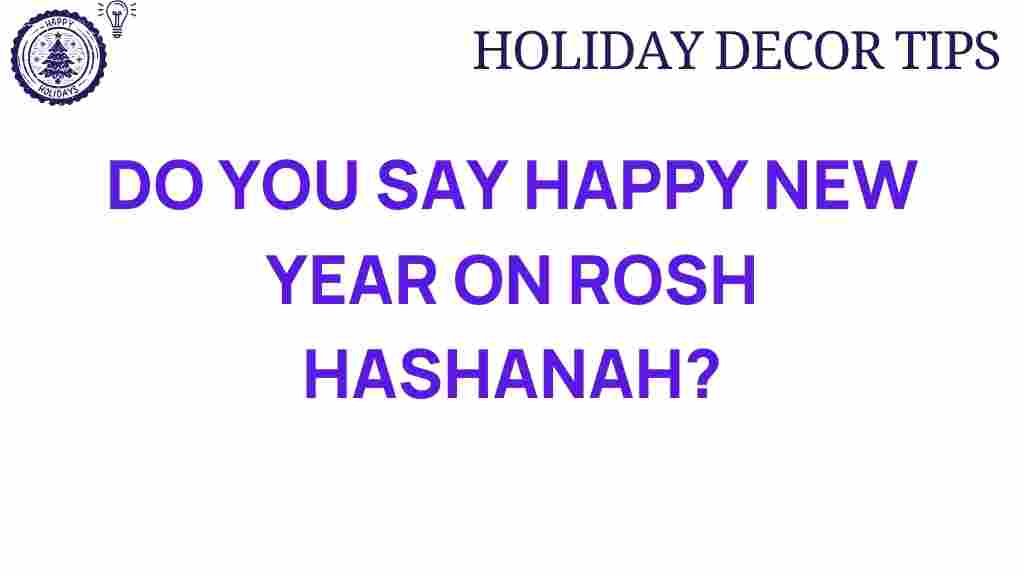Rosh Hashanah: Understanding the Greetings
As the Jewish New Year approaches, a common question arises: “Do you say Happy New Year on Rosh Hashanah?” This query reflects the cultural and religious significance of Rosh Hashanah, a time for reflection, renewal, and celebration. In this article, we will unravel the mystery behind this greeting and explore the traditions associated with Rosh Hashanah.
The Significance of Rosh Hashanah
Rosh Hashanah, which translates to “Head of the Year,” marks the beginning of the Jewish year. It falls on the first two days of Tishrei, the seventh month of the Hebrew calendar, and is a time of spiritual awakening and introspection. Here are some key points about Rosh Hashanah:
- Reflection: It is a time for individuals to reflect on the past year and consider their actions and decisions.
- Renewal: Rosh Hashanah symbolizes the opportunity for renewal and starting afresh.
- Tradition: Many customs accompany Rosh Hashanah, including the blowing of the shofar, a ram’s horn, which serves as a spiritual wake-up call.
Do You Say Happy New Year on Rosh Hashanah?
When it comes to greetings during Rosh Hashanah, saying “Happy New Year” is not typical. Instead, the more appropriate greeting is “Shanah Tovah,” which means “Good Year” in Hebrew. This phrase encapsulates the essence of the holiday—wishing others a year filled with goodness and blessings.
Understanding the Greeting
While “Happy New Year” is widely recognized, it may not fully capture the spiritual depth of Rosh Hashanah. Here’s why “Shanah Tovah” is preferred:
- Cultural Significance: “Shanah Tovah” is deeply rooted in Jewish tradition and emphasizes the importance of the new year in a religious context.
- Spiritual Intent: The greeting reflects the hope for a year of personal growth, health, and peace, aligning with the themes of reflection and renewal.
- Inclusivity: Using the Hebrew greeting can foster a sense of community and connection among those celebrating Rosh Hashanah.
How to Properly Celebrate Rosh Hashanah
Celebrating Rosh Hashanah involves various customs and traditions. Here’s a step-by-step process to ensure you observe the holiday meaningfully:
1. Prepare for Reflection
As the holiday approaches, take time to reflect on your past year. Consider your actions, relationships, and personal growth. This introspection is essential for a meaningful Rosh Hashanah.
2. Attend Services
Many people participate in synagogue services during Rosh Hashanah. The prayers and rituals observed during these services provide a spiritual foundation for the new year.
3. Blow the Shofar
The shofar, a traditional musical instrument made from a ram’s horn, is blown during synagogue services. Its sound serves as a call to repentance and awakening, marking the significance of the holiday.
Gather with family and friends for a festive meal. Traditional foods often include:
- Apples dipped in honey for a sweet year
- Challah bread, often round to symbolize the cycle of the year
- Pomegranates, representing the desire for a year filled with good deeds
5. Extend Your Wishes
As you gather with loved ones, do not forget to extend your greetings. Saying “Shanah Tovah” is a beautiful way to express your hopes for their new year.
Troubleshooting Common Questions
As you prepare for Rosh Hashanah, you may encounter some common questions. Here are a few troubleshooting tips:
What If I’m Not Jewish? Can I Wish Someone a Happy New Year?
If you are not Jewish but want to send well wishes, you can use “Shanah Tovah” to show respect for the holiday. Alternatively, saying “Happy New Year” is also acceptable, especially in casual conversations.
How Do I Respond If Someone Says Happy New Year?
If someone wishes you a “Happy New Year” during Rosh Hashanah, a polite response is to say “Thank you! Shanah Tovah!” This way, you acknowledge their greeting while sharing the appropriate Rosh Hashanah wish.
Can I Send Cards?
Sending Rosh Hashanah cards is a lovely way to connect with friends and family. Include a personal message wishing them a “Shanah Tovah” and perhaps a note of reflection or hope for the coming year.
The Importance of Community During Rosh Hashanah
Rosh Hashanah is not just an individual celebration; it is a communal experience that strengthens bonds within the Jewish community. Engaging with others during this time enhances the holiday’s meaning and fosters a sense of belonging. Here are some ways to build community:
- Join Community Events: Many synagogues and organizations host Rosh Hashanah events. Participating in these activities can deepen your connection to the community.
- Volunteer: Consider volunteering during this time; helping others can enrich your Rosh Hashanah experience.
- Share Traditions: Invite friends or family members to share their own Rosh Hashanah customs and traditions, creating a rich tapestry of celebration.
Conclusion
In conclusion, while it may be tempting to say “Happy New Year” during Rosh Hashanah, the more fitting greeting is “Shanah Tovah.” This phrase not only conveys well wishes for the new year but also encapsulates the spiritual essence of this important holiday. By embracing the traditions and customs associated with Rosh Hashanah, you can create a meaningful celebration that honors the past while looking forward to a year of renewal and growth.
For more insights on Jewish traditions, you can visit this resource. To explore the significance of the shofar and other customs, check out this article.
This article is in the category Themes and created by HolidayDecorTips Team
